Wells and water
Clean water is the most essential basis for a community to be able to provide for itself.
A well changes the history of a village and in particular the lives of the women and girls. Women around the world spend 200 million hours a day drawing water and have to walk long distances to do so. A well in the immediate vicinity therefore means more time for the mothers to look after the family and grow food, as well as enough time for the girls to attend school. Water is life and a well is real help for self-help.
Well construction
A well with a hand pump has the capacity to supply around 500 to 600 people with water. The project comprises the following phases:
Every well project begins with the clarification of requirements, expert surveying and a geological survey.
The deep water source is tapped by drilling (70-90 meters deep) using a truck with a drilling rig. The borehole is then lined and secured.
In rare cases, deeper drilling is necessary. However, this requires the installation of a solar pump, as the conventional hand pump is not designed for such depths.
After drilling, a mechanical hand pump is installed to bring the water the 70-90m to the surface.
In addition, the population is trained in water, hygiene and well maintenance.
Sustainability components such as the technical training of mechanics, the formation and training of local water committees or the establishment of hygiene measures (latrine construction or washing stations) are also implemented.
Unmute the video player.
Our impact
Thanks to your donations
in 2023, we could achieve around
Drilling or renovating wells.
“When we saw the water coming out, we couldn’t believe it. We were all happy, excited and so relieved. The water is clean! Now the children can drink and we don’t have to worry about all the diseases anymore.”
– Awuru Amalia (68)
WASH (water, sanitation and hygiene)
In addition to traditional well drilling, our WASH projects (water, sanitation and hygiene) also include other areas:
Well renovations: Sometimes older wells suffer a burst pipe or other major defects. Such major defects often cannot be repaired by the local well committee. This is why we renovate such wells, for example by removing the pipe from the ground and replacing it.
Sanitary facilities: Hygiene is important to prevent diseases. In sub-Saharan Africa, 18% of the population defecate in the open air. A lack of sanitary facilities often leads to illness. As a result, 5% of deaths in low-income countries are attributable to this problem. This is why we are building latrines.
Hygiene: To ensure hygiene, people not only need latrines, but also the opportunity to wash their hands with soap and water. 74% of sub-Saharan countries lack this access. We are changing this with washing stations.
Current projects
Angola
School nutrition in Angola
CHF 254'000 von CHF 740'999 gespendet
South Sudan
Medical Center South Sudan
CHF 200'000 von CHF 309'000 gespendet
Uganda
WASH – Water and hygiene for Uganda
CHF 148'000 von CHF 440'000 gespendet
Uganda
SMART Center, Karamoja, Uganda
CHF 550'000 von CHF 550'000 gespendet
Projects 2019-2023
2023
We were able to drill 5 wells and rehabilitate 14 in Uganda and Mozambique.
In Uganda, we have rehabilitated 14 wells and drilled one new well.
Location: West Nile, Northern Uganda and Karamoja districts (Uganda)
Project scope:
- 14 fountains renovated
- 1 Well drilled
- Hygiene campaigns carried out
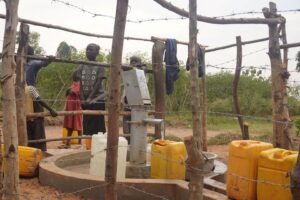
In Mozambique, we were able to finance new wells and latrines at three elementary school in Mirige, Namitil and Pitimpine in Montepuez and one elementary school in Mapupulo. The village communities and schools are relieved and grateful because water and hygiene change everything.
Location: Mapupulo and Montepuez, Cabo Delgado, Mozambique
Population: 11,172 schoolchildren, teachers and other affected persons
2022
We were able to drill 3 wells and rehabilitate 17 in Angola, Uganda and Mozambique.
We have rehabilitated 16 wells in Uganda.
Location: Karamoja district and , Uganda
Project scope:
- 16 fountains renovated
- Latrines built
- Training courses held
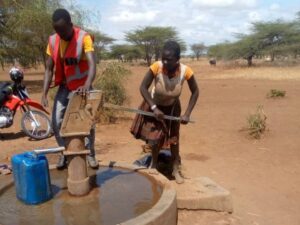
The Mapupulo elementary school in Mozambique has received a new well and latrines. The whole village and the school are relieved and grateful – access to water is now secured.
Location: Mapupulo, Cabo Delgado, Mozambique
Population: 500 schoolchildren (260 girls / 240 boys)
GPS coordinates: 13°13.920 “S 38°52.5130 “E
Construction period: April – October 2022
Drilling depth: 42 meters
Water quality: good
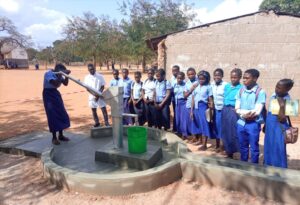
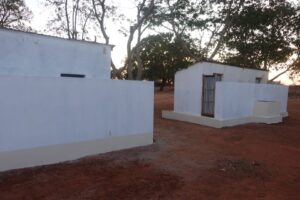
We have renovated the defective well at our partner school Italia. The whole village and the elementary school are relieved and grateful – access to water is now assured.
Location: Catengue, Caimbambo district, Benguela province, Angola
Population: 215 schoolchildren and 670 villagers
GPS coordinates: 13°15’33.0 “S 13°47’11.9 “E
First drilling: Sept. 2013
Defect since: 20.07.2022
Drilling date: 20.10.2022
New drilling depth: 36 meters
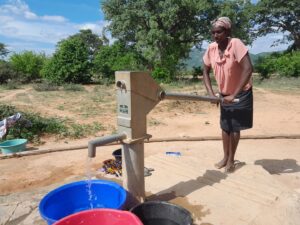
Two more wells have been drilled in Gimbo do Bombo and Bairro Novo and six are still outstanding due to project delays.
2021
We were able to drill 5 wells in Angola.
Kavinjiliti has received a new well. The whole village is relieved and grateful – access to water is now secured.
Location: Kavinjiliti village, Caimbambo district, Angola
Inhabitants: 400
GPS coordinates: -13.063397, 14.019014
Drilling date: 14.08.2021
Drilling depth: 73 meters
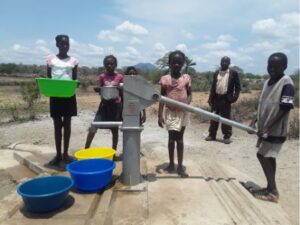
Ventoinha has received a new well. The whole village and the school are relieved and grateful – access to water is now secured.
Location: Ventoinha, Angola
Population: 486 (+261 schoolchildren)
GPS coordinates:12°57’54.5 “S 14°02’23.0 “E
Drilling date: 17.08.2021
Drilling depth: 55 meters
Water quality: very good
Delivery rate: 1.0 l/sec
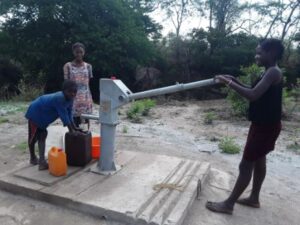
Ventoinha has received a new well. The whole village and the school are relieved and grateful – access to water is now secured.
Location: Cailunga, Angola
Inhabitants: 735
GPS coordinates:13°02’00.3 “S 14°03’27.8 “E
Drilling date: 13.08.2021
Drilling depth: 79 meters
Water quality: very good
Delivery rate: 0.4 l/sec
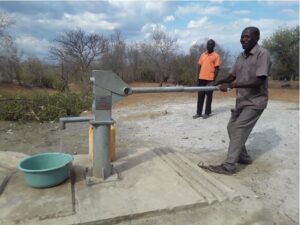
Tchikwã has received a new well. The whole village is relieved and grateful – access to water is now secured.
Location: Tchikwã, Angola
Inhabitants: 613
GPS coordinates: 13°04’05.3 “S 14°06’37.5 “E
Drilling date: 12.08.2021
Drilling depth: 73 meters
Water quality: very good
Delivery rate: 0.3 l/sec
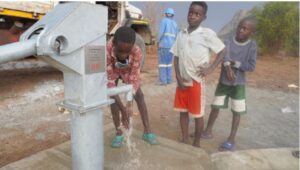
The Calohima well served as a replacement well for the originally planned well in Tchilongola, which was unfortunately a dry well. However, ForAfrika still hopes to be able to help the community.
Location: Calohima village, Caimbambo district, Angola
Inhabitants: 613
GPS coordinates: -13.109139, 14.120639
Drilling date: 11.08.2021
Drilling depth: 73 meters
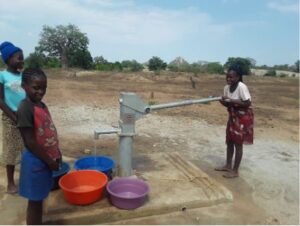
2020
We were able to drill 8 wells in Angola and 2 wells and latrines in Mozambique.
Kalea has received a new well. The whole village and our sponsored school are relieved and grateful – access to water is now assured.
Location: Kalea, Angola
Population: 660 inhabitants and 236 children
GPS coordinates:
13°04’47.1 “S 13°56’08.4 “E
Drilling date: 16.05.2020
Drilling depth: 55 meters
Water quality: Very good
Delivery rate: 0.7 l/sec
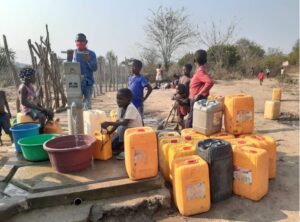
Molowa II has received a new well. The whole village and the school are relieved and grateful – access to water is now secured.
Location: Molowa II, Angola
Population: 900 (+347 schoolchildren)
GPS coordinates:
13°06’05.0 “S 13°58’44.0 “E
Drilling date: 05.05.2020
Drilling depth: 43 meters
Water quality: very good
Delivery rate: 0.7 l/sec
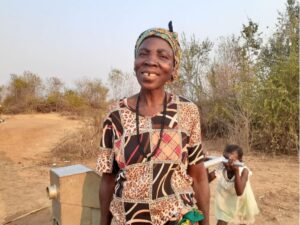
Tchingulita has received a new well. The whole village and the school are relieved and grateful – access to water is now secured.
Location: Tchingulita, Angola
GPS coordinates:
13°03’42.5 “S 13°59’51.1 “E
Drilling date: 08.05.2020
Drilling depth: 73 meters
Water quality: Good
Delivery rate: 0.3 l/sec
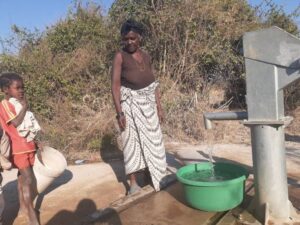
Chiloñe has received a new well. The whole village is relieved and grateful – access to water is now secured.
Location: Chiloñe, Angola
Inhabitants: 770
GPS coordinates:
12°13’04.6 “S 14°17’49.9 “E
Drilling date: 02.06.2020
Drilling depth: 55 meters
Water quality: Good
Delivery rate: 1.1 l/sec
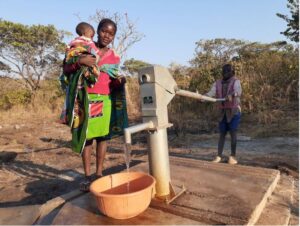
Epomo has received a new well. The whole village is relieved and grateful – access to water is now secured.
Location: Epomo, Angola
Inhabitants: 650
GPS coordinates:
12°20’24.6 “S 14°05’36.8 “E
Drilling date: 19.03.2020
Drilling depth: 73 meters
Water quality: Very good
Delivery rate: 0.3 l/sec
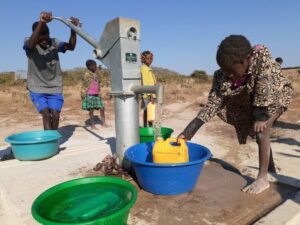
The Cavimbi II elementary school has received a new well. The school is relieved and grateful – access to water is now assured.
Location: Cavimbi II, Angola
Population: 462 Schoolchildren
GPS coordinates:
12°12’05.4 “S 14°19’44.0 “E
Drilling date: 01.06.2020
Drilling depth: 55 meters
Water quality: Good
Delivery rate: 0.8 l/sec
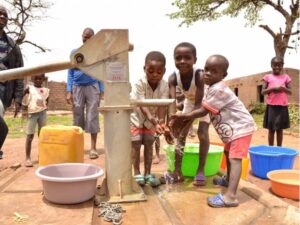
Candão has received a new well. The whole village is relieved and grateful – access to water is now secured.
Location: Candão, Angola
Inhabitants: 405
GPS coordinates:
12°24’10.9 “S 14°02’42.6 “E
Drilling date: 30.05.2020
Drilling depth: 53 meters
Water quality: Very good
Delivery rate: 0.4 l/sec
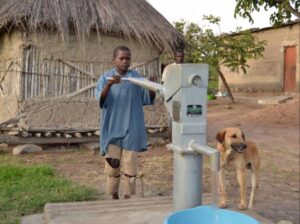
Matsenhane has received a new well. The whole village and the school are relieved and grateful – access to water is now secured.
Location: Matsenhane, Vilankulo District, Inhambane Province, Mozambique
Population: 145 families, 144 schoolchildren, 8 teachers
GPS coordinates:
22°15’23.8 “S 35°11’35.0 “E
Drilling date: 30.08.2020
Drilling depth: 39 meters
Latrines: 6 (4x children, 2x adults)
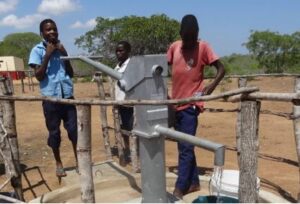
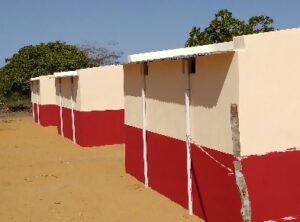
Chibamo has received a new solar well. The whole village and the school are relieved and grateful – access to water is now secured. The well was sponsored by Markus Franke and the company Biral AG.
Location: Chibamo, Inhassoro District, Mozambique
Population: 366 families, 353 schoolchildren and 8 teachers
GPS coordinates:
21°33’19.8 “S 35°07’33.8 “E
Type of well: Solar well
- Water tower with 10,000 liter tank erected
- Solar panels, pump and control unit installed
- 6 water stations built
- 12 members of the water committee trained
- At least. 1,000 people have access to clean water
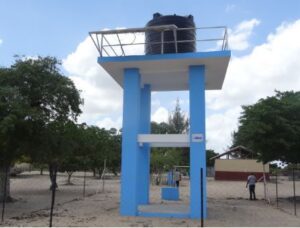
2019
We were able to drill 4 wells in Angola.
Malowa I has received a new well. The whole village and the school are relieved and grateful – access to water is now secured.
Location: Malowa I, Benguela Province, Angola
Population: approx. 1650 people (incl. 405 schoolchildren)
GPS coordinates:
13°04’15.0 “S 13°58’46.0 “E
Drilling date: 07.03.2019
Drilling depth: 49 meters
Delivery rate: 0.7 l/sec
Water quality: Very good
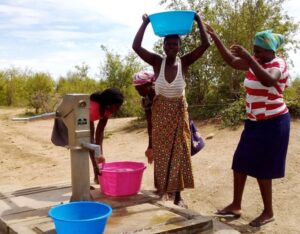
Luvundo has received a new well. The whole village and the school are relieved and grateful – access to water is now secured.
Location: Luvundo, Chongoroi Municipality, Angola
Inhabitants: 528
GPS coordinates:
13°27’53.0 “S 14°11’54.0 “E
Drilling date: 17.03.2019
Drilling depth: 73 meters
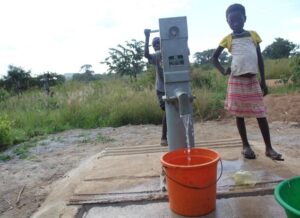
Kamaya II has received a new well. The whole village is relieved and grateful – access to water is now secured.
Location: Kamaya II, Benguela Province, Angola
Inhabitants: 261
GPS coordinates:
13°32’54.0 “S 13°56’14.0 “E
Drilling date: 09.03.2019
Drilling depth: 73 meters
Delivery rate: 0.3 l/sec
Water quality: Very good
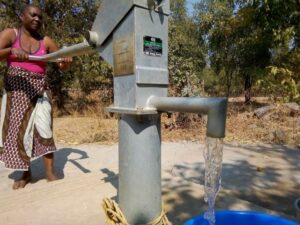
Ramieira has received a new well. The whole village and the school are relieved and grateful – access to water is now secured.
Location: Ramieira, Angola
Inhabitants: 354
GPS coordinates:
13°15’59.0 “S 14°43’53.0 “E
Drilling date: 18.02.2019
Drilling depth: 31 meters
Delivery rate: 0.3 l/sec
Water quality: Very good
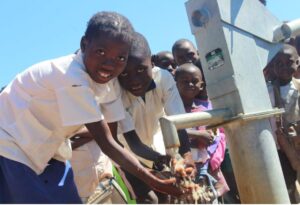
Donate now
Supplying 500 to 600 people with clean water by building wells costs around CHF 17,000 (may vary depending on the country and the scope of the project). This amounts to 34 francs per person.
The well supplies people with water for years and helps to save water. According to studies by the World Health Organization (WHO), one franc invested in water and sanitation results in savings of around nine francs, for example in the treatment of diseases. Help us today with a donation.


